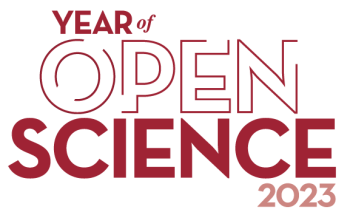Year of Open Science
About open science

The White House Office of Science and Technology Policy (OSTP) announced 2023 as the Year of Open Science.
The principle and practice of making research products and processes available to all, while respecting diverse cultures, maintaining security and privacy, and fostering collaborations, reproducibility, and equity. - OSTP and the National Science and Technology Council (NSTC)
At a federal level, this includes activities like new grant funding, improvements in research infrastructure, and building on OSTP's 2022 memorandum, Ensuring Free, Immediate, and Equitable Access to Federally Funded Research. At the Libraries, this means continuing to support University of Minnesota researchers in making their research publications and data openly available, as well as leading the University's participation in the Higher Education Leadership Initiative for Open Scholarship (HELIOS).
The University of Minnesota and University Libraries celebrate the Year of Open Science by
- embracing Open Access as a principle and set of actions,
- showcasing the work being done in the Libraries,
- highlighting the researchers engaging in Open Science, and
- hosting events and workshops
Let us know if you, or you know of someone who, would like to be profiled by contacting openaccess@umn.edu.
Open science resources
- Open access at UMN Information, approaches, and resources for achieving open access.
- Research data services consultations Personalized consultations can be requested by individuals or lab/research groups on topics such as: data management plans (DMPs); data sharing; and data management for specific projects.
- Data Repository for U of M (DRUM) DRUM is an institutional repository for University of Minnesota researchers, students, and staff to share data, with 10+ discipline-specific curators who ensure your work is findable, accessible, interoperable, and reusable.
- Data Curation Network The DCN is a membership organization of institutional and non-profit data repositories whose vision is to advance open research by making data more ethical, reusable, and understandable. Based at the University of Minnesota, the DCN facilitates a shared-curation workflow.
- Publishing services The University Libraries provides consultations about general publishing questions, and publishes journals, books, dynamic scholarly serials, and textbooks through the University of Minnesota Libraries Publishing imprint.
- University Digital Conservancy As the institutional repository of the University of Minnesota, the UDC provides free, public access and long-term preservation to work created at the University.
- NIH Data Management & Sharing Policy 2023 The Libraries' research data services can help with developing data management and sharing plans mandated by the National Institutes of Health (NIH) Data Management and Sharing (DMS) policy.
Stories and news
Spotlight: Jon Schommer
Jon C. Schommer is a professor at the University of Minnesota. He received his BS, MS, and PhD degrees from the University of Wisconsin – Madison. Since graduating with his PhD in 1992, he has devoted his career to teaching and research. Much of his work is related to the pharmacist workforce at both national and state levels. Schommer created INNOVATIONS in pharmacy, an open access academic journal, published by the University of Minnesota Libraries, in 2010.
Spotlight: Dr. Peter Neff
Peter Neff is an assistant research professor at the University of Minnesota and Director for Field Research and Data for the Center for Oldest Ice Exploration (COLDEX), a National Science Foundation funded Science and Technology Center pursuing the oldest ice core climate records found in Antarctica.
Spotlight: Dr. Kathy Draeger
Kathy Draeger is Statewide Director for the U of M Regional Sustainable Development Partnerships and adjunct professor of Agronomy and Plant Genetics. She oversees statewide programming in sustainable development, including clean energy and sustainable ag and food systems.
Dr. Melissa Kenney
Dr. Melissa Kenney is the Director of Research and Knowledge Initiatives at the University of Minnesota’s Institute on the Environment where she directs efforts to build synergy across IonE’s broad scientific research portfolio.
Spotlight: Dr. Randal Barnes
Dr. Randal Barnes is an Associate Professor and Mental Health Advocate in the Department of Civil, Environmental, and Geo- Engineering. His research interests include mathematical modeling in geological and civil engineering.
AgEcon Search as a climate justice resource
Climate researchers who are looking for studies on the economic aspects of their topics have a rich resource in AgEcon Search, the open access repository for agricultural and applied economics.
Why publish open access?
University of Minnesota faculty members Moin Syed and Jonathan Schilling provide some reasons why faculty members should consider publishing open access in this video.
Events
August 2023
August 29
Posting and Discovering Preprints (bonus: a demo of depositing in OSF's preprint repositories)
1 p.m. to 2 p.m.
September 2023
September 21
The Fault in Our Publishing Agreements
3 p.m. to 4 p.m.
October 2023
October 10
The Fault in Our Publishing Agreements
2 p.m. to 3 p.m.
October 26
A Conversation about Open Science with Dr. Stephen J. Eglen
1:00-2:00 pm
November 2023
November 7
This webinar will discuss how “green open access” can assist researchers in making their research more accessible and visible.
11 a.m. to noon